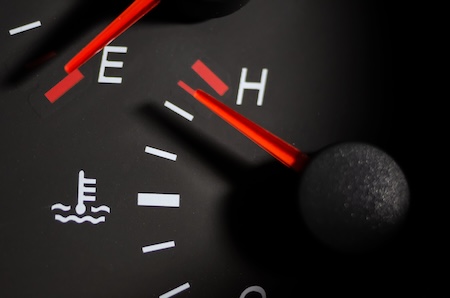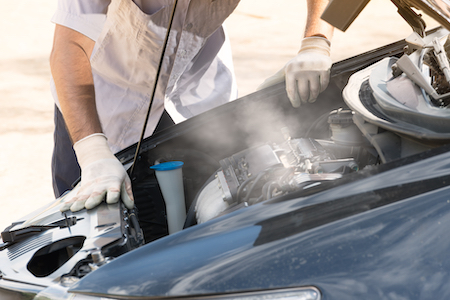Has this ever happened to you? You’re driving up I-70 toward the mountains or inching along I-25 in summer traffic. Suddenly, you notice it: the temperature gauge creeping toward the red. Or worse, steam billowing from under your hood.
That’s engine overheating, and it’s not something to ignore.
It can start small. Maybe a faint burning smell or an unusually hot dashboard. But if left alone, overheating can lead to warped engine parts, head gasket failure, or even complete engine shutdown. That’s when “I’ll get to it later” turns into a tow truck and a repair bill that hurts.
Let’s talk about how to catch it early. And what you should do if your engine ever overheats.
Why Engines Overheat: What’s Really Going On Under the Hood
Your engine generates a lot of heat when it runs. To keep everything in check, your cooling system:
- Circulates coolant through the engine block
- Sends hot coolant to the radiator to release heat
- Cycles cooled fluid back through the engine
If any part of that system fails, things heat up—fast.
Common causes of engine overheating include:
- Low coolant levels (due to leaks or neglect)
- Blocked or broken radiator
- Failed thermostat (stuck closed)
- Broken water pump
- Radiator fan failure
- Cracked hoses or belts
- Coolant that’s old or not rated for Denver weather
Here in Colorado, big elevation changes and extreme temperatures add stress. That’s why Denver drivers see a lot of cooling system issues, especially during summer or when driving up into the mountains.
Warning Signs That Your Engine is Overheating
Wouldn’t it be nice if your car gave you early warning signs to tell you the engine is having trouble? There is. If you catch the problem early, you can often prevent serious damage. Look for these red flags:
Temperature Gauge Climbing into the Red
This is your first warning. If the needle is rising quickly, it’s time to take action.
Steam or Smoke from the Hood
Looks like smoke, smells sweet or burnt? That’s likely steam from boiling coolant.
Unusual Smells
A sweet, syrupy smell could mean leaking coolant. A burning smell? Possibly oil or rubber—both signs something’s too hot.
Poor Engine Performance
Overheating engines can cause your car to lag, stall, or even enter limp mode.
Dashboard Lights
You may see the temperature warning light, or even the check engine light if the overheating affects other components.
What to Do If Your Engine Starts Overheating
If you’re driving and notice any of the above signs, don’t panic. But do act quickly.
Step 1: Turn Off the A/C and Crank the Heater
Strange advice? Maybe. But turning on the heater pulls heat away from the engine block and into the cabin. It can buy you time.
Step 2: Pull Over Safely
Don’t keep driving if the engine is too hot. Pull over, turn off the engine, and let it cool. Never open the radiator cap while the engine is hot—boiling coolant can cause serious burns.
Step 3: Check Coolant Levels
If the engine is cool enough (after 30–45 minutes), check your coolant reservoir. If it’s low and you have coolant with you, top it off. This may allow you to get to a shop without towing.
Step 4: Call for Help
If topping off coolant doesn’t solve the issue, or if you suspect a more serious problem, call your mechanic or tow service. Continuing to drive a hot engine can lead to major damage, meaning your repair bills will be sky-high.
Prevent Overheating Before It Starts
You don’t have to wait for an emergency to think about overheating. Smart, regular maintenance can prevent it altogether.
Check Coolant Levels Regularly
Make it a habit—monthly at least, and before long trips or heading into the mountains.
Replace Coolant at Manufacturer Intervals
Old coolant loses its ability to protect your engine from heat and corrosion. Typically, coolant should be flushed and replaced every 30,000 to 60,000 miles.
Inspect Radiator and Hoses
Look for cracks, leaks, or bulges, especially before summer heat hits.
Keep an Eye on Your Temperature Gauge
Know what “normal” looks like for your car. If you notice creeping temps, don’t ignore them.
Get Routine Maintenance Checks
When you come in for oil changes or service, we always take a peek at your cooling system. It’s the easiest way to catch small problems before they turn into major ones.
Why Overheating Is a Big Deal in Denver
You might wonder—why talk so much about overheating in Colorado?
Denver’s unique mix of climate, elevation, and driving styles make us especially prone to engine temperature problems:
Thin mountain air = less cooling efficiency
Driving into higher elevations reduces the air pressure your radiator depends on to cool things down.
Hot summers + stop-and-go traffic = strain
City commutes increase engine temps fast, especially in our ever-increasing rush-hour traffic.
Road trips into the Rockies = uphill engine stress
Heading to Estes Park, Breckenridge, or Vail? Those climbs put a major load on your cooling system.
All of that makes preventative cooling system maintenance even more critical for Denver drivers.
What Happens If You Ignore It?
Ignoring overheating won’t make it go away. It’ll just make it worse. Continued driving with a hot engine can lead to:
- Warped or cracked cylinder heads
- Blown head gaskets
- Damaged pistons
- Complete engine failure
That little rise in your temperature gauge? It could turn into a huge repair bill if you keep driving.
How We Help
At our family-owned shop in Denver, we know exactly how Colorado’s conditions affect your engine. When you bring your vehicle in, we:
- Inspect your full cooling system: radiator, hoses, thermostat, and water pump
- Check for leaks and pressure loss
- Test your coolant’s temperature protection and fluid condition
- Make sure your system is ready for summer (or mountain adventures)
Whether your car’s already showing signs of trouble or you just want peace of mind, we’re here to help you keep your engine cool, calm, and protected.
Don’t Wait Until It’s Too Late
Engine overheating is one of those issues that starts small, but can turn ugly fast. A strange smell, a rising gauge, a puff of steam; these are your early warnings.
Don’t ignore them. Trust your instincts and bring your car in.
We’re here to help Denver drivers stay safe, cool, and confident, no matter what the weather or terrain throws your way.
If you’ve noticed signs of engine overheating, or just want to make sure your cooling system is in top shape, schedule your inspection today. We’ll help you handle the heat before it turns into a major problem.


